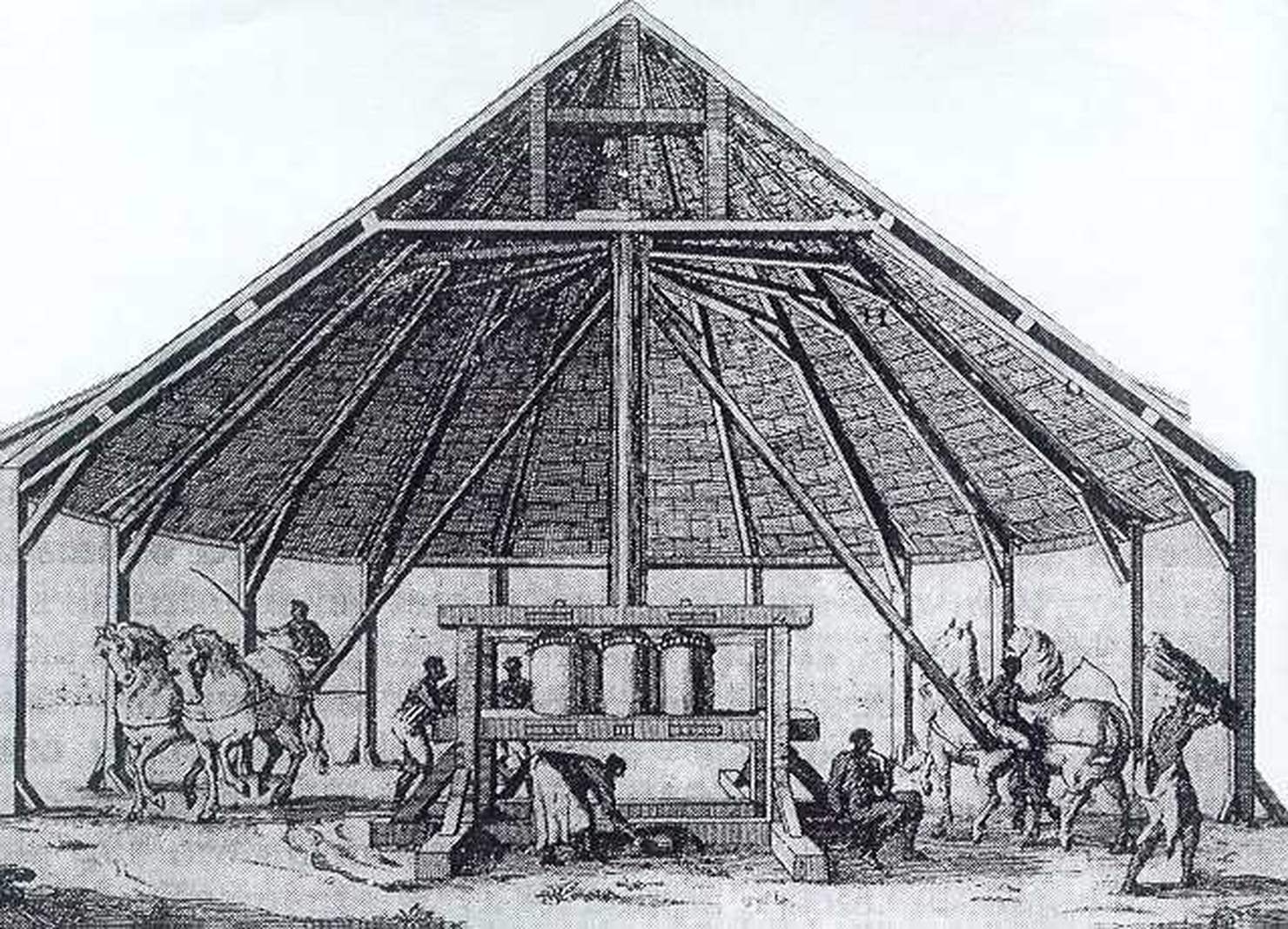Trapiche on:
[Wikipedia]
[Google]
[Amazon]
 A trapiche is a
A trapiche is a
/ref> has arrived to the other languages of the
 A trapiche is a
A trapiche is a mill
Mill may refer to:
Science and technology
*
* Mill (grinding)
* Milling (machining)
* Millwork
* Textile manufacturing, Textile mill
* Steel mill, a factory for the manufacture of steel
* List of types of mill
* Mill, the arithmetic unit of the A ...
made of wooden rollers used to extract juice
Juice is a drink made from the extraction or pressing of the natural liquid contained in fruit and vegetables. It can also refer to liquids that are flavored with concentrate or other biological food sources, such as meat or seafood, such ...
from fruit, originally olives, and since the Middle Ages
In the history of Europe, the Middle Ages or medieval period lasted approximately from the late 5th to the late 15th centuries, similar to the post-classical period of global history. It began with the fall of the Western Roman Empire ...
, sugar cane
Sugarcane or sugar cane is a species of (often hybrid) tall, perennial grass (in the genus '' Saccharum'', tribe Andropogoneae) that is used for sugar production. The plants are 2–6 m (6–20 ft) tall with stout, jointed, fibrous stal ...
as well. By extension the word is also sometimes applied to the location of the mill, whether the workshop or the entire plantation.
Etymology
The word has its origin in theLatin
Latin (, or , ) is a classical language belonging to the Italic branch of the Indo-European languages. Latin was originally a dialect spoken in the lower Tiber area (then known as Latium) around present-day Rome, but through the power ...
'' trapetum'' that means oil mill. From the Sicilian language
Sicilian ( scn, sicilianu, link=no, ; it, siciliano) is a Romance language that is spoken on the island of Sicily and its satellite islands. A variant, ''Calabro-Sicilian'', is spoken in southern Calabria, where it is called Southern Calabro ...
''trappitu Charles Verlinden & Eberhard Schmitt, ''Die mittelalterlichen Ursprünge der europäischen Expansion,'' tom I de ''Dokumente zur Geschichte der europäischen Expansion,'' Wiesbaden, Otto Harrassowitz Verlag, 1986, pàgina 169, '' the term, crossing the Mozarab
The Mozarabs ( es, mozárabes ; pt, moçárabes ; ca, mossàrabs ; from ar, مستعرب, musta‘rab, lit=Arabized) is a modern historical term for the Iberian Christians, including Christianized Iberian Jews, who lived under Muslim rule in ...
Valencia
Valencia ( va, València) is the capital of the autonomous community of Valencia and the third-most populated municipality in Spain, with 791,413 inhabitants. It is also the capital of the province of the same name. The wider urban area al ...
, with its typical change of termination to «-ig» via the Catalan language
Catalan (; autonym: , ), known in the Valencian Community and Carche as '' Valencian'' ( autonym: ), is a Western Romance language. It is the official language of Andorra, and an official language of three autonomous communities in eas ...
(''trapig'' -Gandía, 1536-, ''trapitz de canyamel'' -Mallorca, 1466-)Corominas: trapig en Gandía, 1536, y trapitz de canyamel en Mallorca, 1466/ref> has arrived to the other languages of the
Iberian peninsula
The Iberian Peninsula (),
**
* Aragonese and Occitan: ''Peninsula Iberica''
**
**
* french: Péninsule Ibérique
* mwl, Península Eibérica
* eu, Iberiar penintsula also known as Iberia, is a peninsula in southwestern Europe, defi ...
as ''trapiche.'' In the documents of the Duke of Gandía
Duke of Gandía ( ca-valencia, Ducat de Gandia, ) is a title of Spanish nobility that was first created in 1399 by Martin of Aragon and granted to Alfonso of Aragon and Foix. It has its origin in the lordship of Gandía created in 1323 by James I ...
from the beginning of the fifteen century, one can see the term «trapig de canyamel», as a synecdoche
Synecdoche ( ) is a type of metonymy: it is a figure of speech in which a term for a part of something is used to refer to the whole ('' pars pro toto''), or vice versa ('' totum pro parte''). The term comes from Greek .
Examples in common En ...
to indicate the whole village engenho
Engenho () is a colonial-era Portuguese language, Portuguese term for a cane sugar mill, sugar cane mill and the associated facilities. In Spanish language, Spanish-speaking countries such as Cuba and Puerto Rico, they are called ingenios. Both wor ...
. According to Herrera: ''"..es de notar que antiguamente no auuia azucar,ſino en Valencia"'' ("note that in the old days there was no sugar except in Valencia").